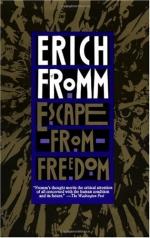
|
| Name: _________________________ | Period: ___________________ |
This test consists of 15 multiple choice questions and 5 short answer questions.
Multiple Choice Questions
1. What group of people fought in battles for freedom, as identified by Fromm?
(a) The church.
(b) The wealthy.
(c) The oppressed.
(d) The Middle Class.
2. What is the name of Franz Kafka's work that Fromm references in his book?
(a) The Trial.
(b) Castle.
(c) Amerika.
(d) Throne.
3. What is individuation?
(a) A time when an individual gives up his individuality.
(b) When an individual loses his identity to the group.
(c) The process by which the group singles out an individual.
(d) The growing process of the individual.
4. Which of the following did man NOT have to face while living in Eden?
(a) Work.
(b) Happiness.
(c) Freedom.
(d) Choice
5. What psychological behavior was the main theme of Hitler's ideology?
(a) Fear.
(b) Freedom.
(c) Submission.
(d) Empathy for others.
6. What war do many consider to be ultimate victory for freedom, according to Fromm?
(a) World War II.
(b) The American Revolution.
(c) The French Revolution.
(d) World War I.
7. According to Fromm's animal kingdom analogy, why is man so helpless at birth?
(a) Man is disconnected from his fellow man.
(b) Man relies on learning in order to adapt to nature.
(c) Man is disconnected from nature.
(d) Man needs others to guide him.
8. What goal does Fromm identify as the "abolition of external domination"?
(a) Obedience to a leader.
(b) Freedom for the group.
(c) Freedom of the individual.
(d) A harmonious society.
9. How has the role of the "boss" changed in the modern world?
(a) There is no boss.
(b) The boss is more involved.
(c) The boss has a less personal role and is more anonymous.
(d) The boss works alongside his workers.
10. Who described moral isolation in "The Inventor's Suffering"?
(a) Marx.
(b) Freud.
(c) Balzac.
(d) Fromm.
11. Why does an individual adapt to a new situation and habit?
(a) They adapt to a new situation out of necessity to a situation.
(b) They adapt whn an old habit is broken in favor of a new one.
(c) They adapt to a situation out of choice.
(d) They adapt when a new habit cannot be formed.
12. What does Fromm identify as the main motive for human behavior?
(a) Self-Preservation.
(b) Individual freedom.
(c) Group belonging.
(d) Isolation.
13. What feeling did the inflation in 1923 Germany and the American crash in 1929 create?
(a) Power.
(b) Individuality.
(c) Freedom.
(d) Insecurity.
14. What psychological approach did Fromm take with his work?
(a) Medical.
(b) Physiological.
(c) Social psychological.
(d) Psychoanalytical.
15. Why is man unable to to realize his individuality when discovering his freedom?
(a) He does not care about his individuality.
(b) He is unable to govern himself.
(c) He feels too guilty.
(d) He is unaware of the power of his actions.
Short Answer Questions
1. Why was medieval man in bondage?
2. What tool developed out of the new capitalistic system that helped promote business?
3. Which of the following is NOT a way in which a child grows during the individuation process?
4. Who accompanied Robinson Crusoe on his adventures?
5. What is man's "biological weakness"?
|
This section contains 486 words (approx. 2 pages at 300 words per page) |

|




